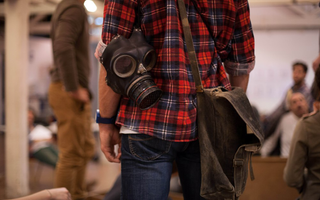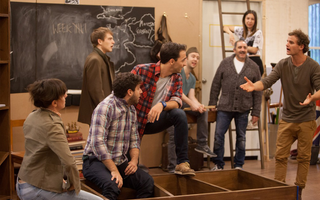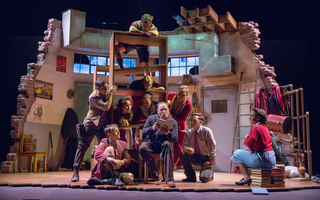Read the program article for Damien Ryan's 2014 production of Henry V by Brendan Gullifer.
‘The object of war is not to die for your country, but to make the other bastard die for his.’
So said famous American general George S. Patton, apparently. (There are a number of variations.)
Patton commanded the Seventh and the Third United States armies. He is remembered for his capacity to inspire enduring loyalty from his men during World War II through speeches underpinned by profanity.
In the 1970 autobiographical film Patton, the general says Americans love to fight.
‘All real Americans love the sting of battle. Americans love a winner and will not tolerate a loser.’
George C Scott brought supreme confidence to the role. His performance showed great leaders never doubt. In the face of defeat, they rouse and rally. They motivate young men to die. They hold firm, even in the face of inevitable failure.
In the movie, Patton's robust language was softened to avoid an R rating.
‘The Nazis are the enemy,’ he says. ‘Wade into them. Spill their blood. Shoot them in the belly. When you put your hand into a bunch of goo, that a moment before was your best friend's face, you know what to do.’
The film won seven Academy Awards. It launched the career of Francis Ford Coppola, who helped write the script.
Less than a decade later, deep in the jungles of the Philippines, Coppola would again grapple with themes of combat. For many, Apocalypse Now remains a singular commentary on the madness and contradiction of war.
The director, not then 40, faced a myriad of challenges in the film's production: a heart attack by his lead actor, a shooting schedule thrown into chaos by a typhoon, an unpredictable Philippine military, cocaine parties by the crew, a drug-addled Dennis Hopper and not least of all, Marlon Brando.
Brando arrived on the set obese. He hadn't learned his lines or done any preparation for the role of Kurtz. His fee alone was reportedly one million dollars a week. And so 900 cast and crew went into hiatus while Coppola got him ready.
The young director recalled the whole experience: ‘We were in the jungle, there were too many of us, we had access to too much money, too much equipment and little by little, we went insane.’
The images of Apocalypse Now remain endemic: helicopter gunships sweeping low over an Asian sea, the appalling splendor of a napalmed jungle, boy-soldiers dropping acid and surfing, a Playboy concert turned awry and those indelible final scenes of pagan sacrifice.
But it’s the words, always the words, which resonate long after the credits.
Kilgore's ode to the smell of napalm and victory, Kurtz's whispered homage – the horror, the horror – and Cpt. Willard's prophetic: ‘I wanted a mission, and for my sins they gave me one.’
In Henry V, Shakespeare introduces us to the power of rhetoric – the ability to stir souls, to bring light into darkness, to hold fast and to conquer.
Language is the play's most efficient weapon. The young king, once a dilettante, has been forged. The death of his father has thrust Hal centre stage and into war.
We watch Henry talk his way in and out of every challenge. His sometimes desperate, sometimes considered verbal outbursts bring victory at Harfleur.
He argues with common soldiers who have lost faith in his leadership and ethics.
He rallies his broken troops before Agincourt and finally he seduces Kate.
She begins by asking, ‘Is it possible I should love the ennemi of France?’ She then ends up in his arms and on his lips.
If this play explores one essential thing it is this – what a man can do through the power of words. And by so doing, Shakespeare asks just how susceptible we are to rhetoric and persuasion.
Henry's words works on us as an audience, just as they work on his beleaguered men. Mark Van Doren famously called Henry's word-music ‘the golden throatings of a hollow God’.
And what are we to think of young Henry? Is he hero or convincing psychopath?
As Henry V director Damien Ryan asked in conversation with this author: 'When Henry cuts the throats of enemy prisoners at Agincourt, does he commit a war crime or show great clarity?'
It's like a snail crawling along the edge of a straight razor. In the apocalyptic jungle, Kurtz says that's his dream. That's his nightmare.
In a 1946 lecture, poet WH Auden calls Hal the Machiavellian character, master of himself and the situation.
‘Hal has no self. He can be a continuous success because he can understand any situation, he can control himself and he has physical and mental charm. But he is as cold as a fish. Hal is the type who becomes a college president, a government head etc., and one hates their guts.'
Shakespeare lures us into the separation of war, its juxtapositions of victory and loss. He is on intimate acquaintance with the conflict that exists in every human heart, between the rational and irrational, between good and evil.
And good does not always triumph. We know that. Shakespeare knew that. Every writer who has attempted to unravel this bloody tangle grapples with this fundamental question.
To quote from Coppola: ‘Sometimes, our dark side overcomes what Lincoln called the better angels of our nature. Every man has got a breaking point.’
And what of the outcomes, the supreme sacrifice? European hillsides scattered with crosses. The soil of Kokoda soaked in blood. Sons and brothers hacked down like daisies.
In the end peace assumes its own life, and by so doing eventually loses all lustre. We cross borders with only a passport and visa, pausing only to change currency. In Europe these days, it's not even that.
Shakespeare has Burgundy ask a question we struggle to answer.
What rub or what impediment is there,
Why that the naked, poor and mangled Peace,
Should not in this best garden of the world,
Put up her lovely visage…
We long for peace. We die for it. And when it arrives the battlefields become cloaked in silence.
Years pass. The desire for conquest ebbs forward and harmony evaporates once again, as quickly as steam from a kettle.
Agincourt. The Somme. Korea. Vietnam. Iraq. The Ukraine.
Razed cities, streets filled with corpses, children turned into orphans. War, it seems, is depressingly inevitable.
And what of the victors? Are the spoils always worth the predictable cost?
The film Patton ends with the general walking his dog. In voiceover, George C. Scott speaks of the honor of triumph. He paints a word-picture of a tumultuous parade undertaken by Roman soldiers.
'In the procession came trumpeters and musicians and strange animals from the conquered territories, together with carts laden with treasure and captured armaments,' he says, evoking the sweetness of victory.
'The conqueror rode in a triumphal chariot, the dazed prisoners walking in chains before him. Sometimes his children, robed in white, stood with him in the chariot, or rode the trace horses.'
But the general finishes on a caveat, advice both resonant and poignant that tarnishes the patina of triumph with a note of caution.
'A slave stood behind the conqueror,' Patton says, 'holding a golden crown, and whispering in his ear a warning … all glory is fleeting.'
Brendan Gullifer is a Sydney writer who now works in politics.







